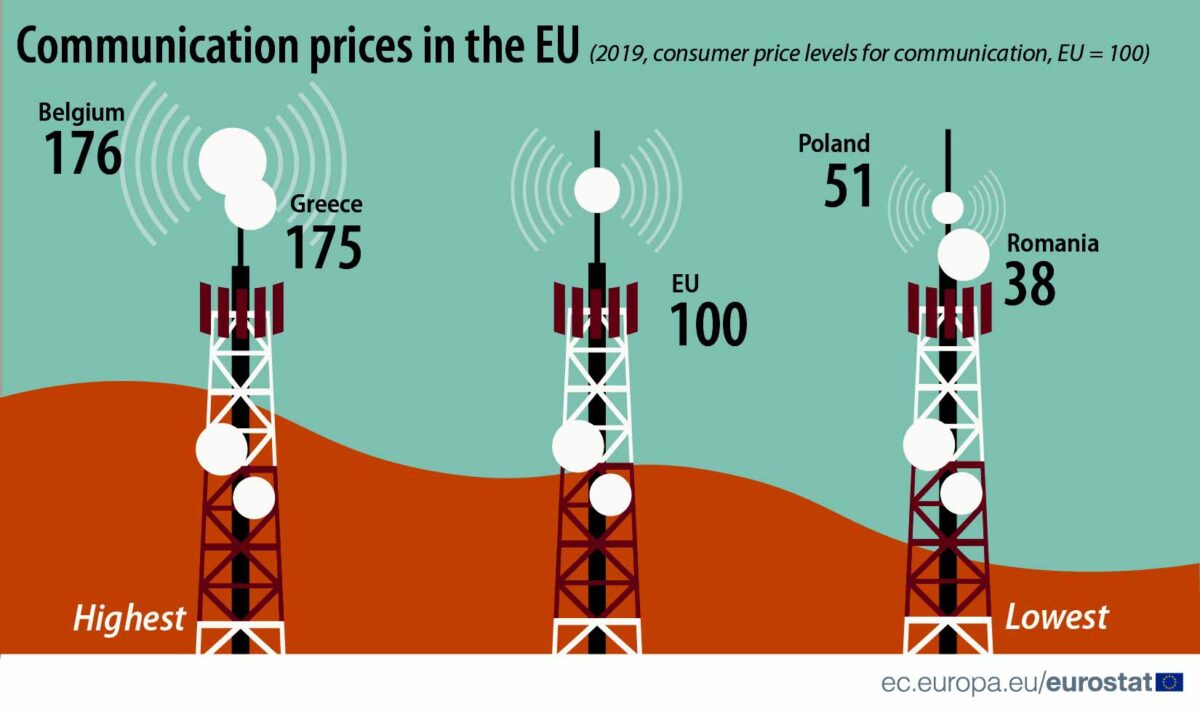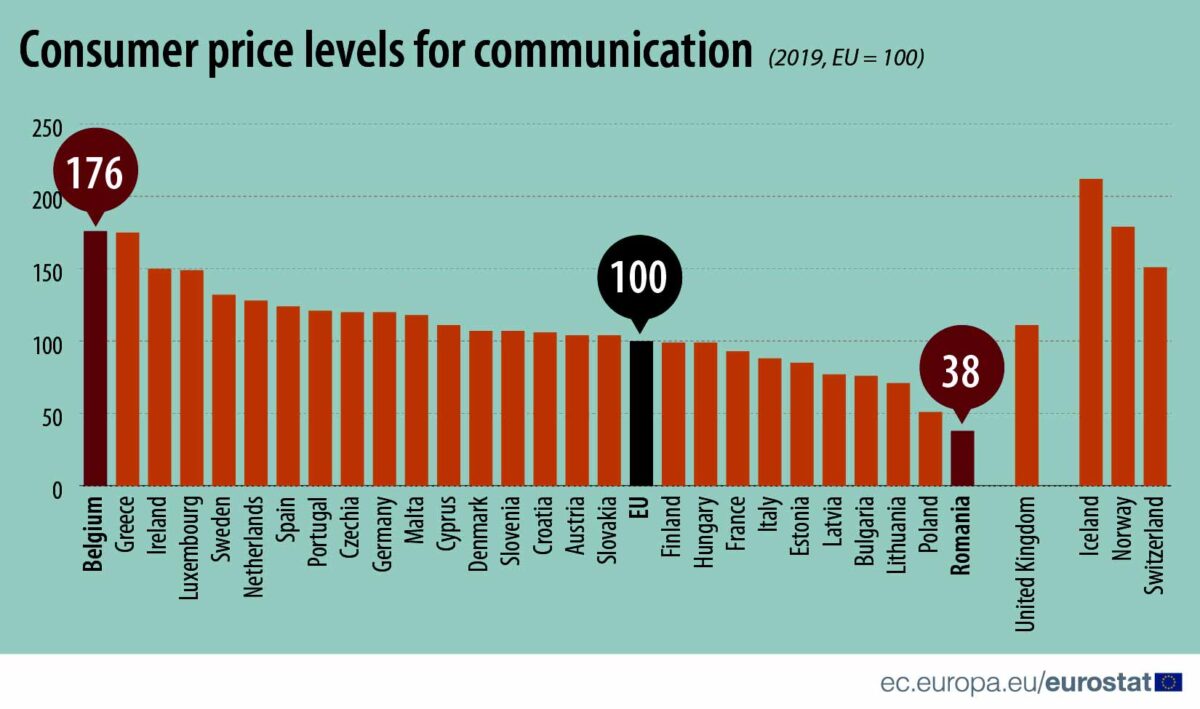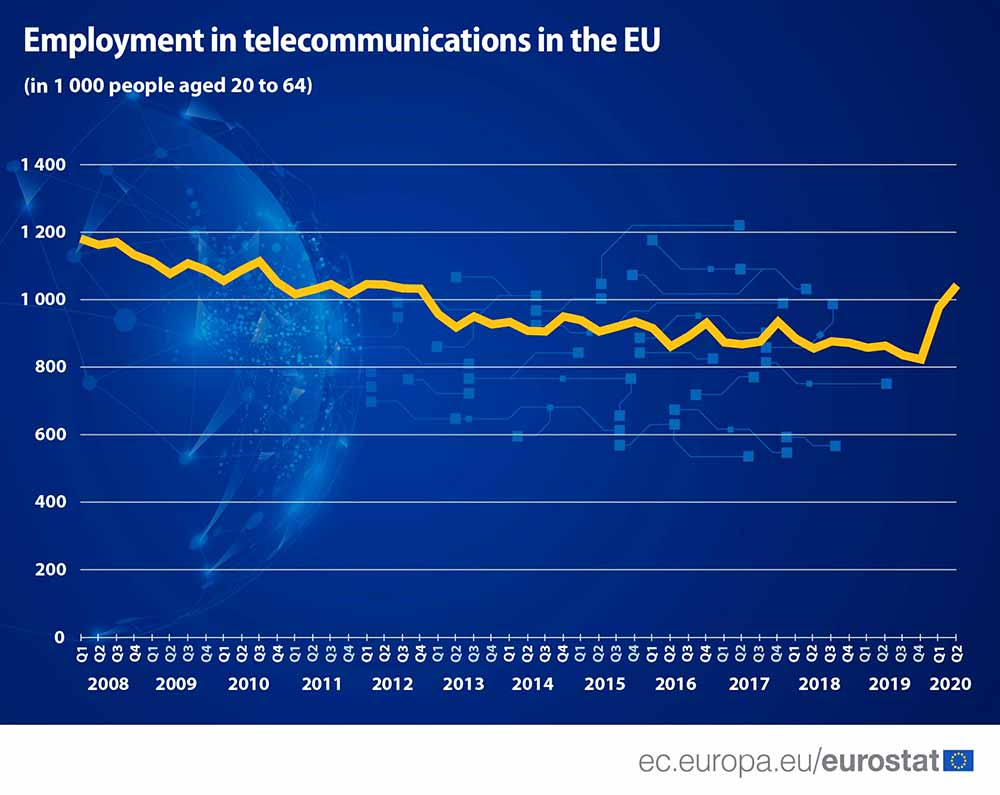Communication prices across the EU in 2019 were almost five times as high in the most expensive EU State than in the cheapest one. Eurostat presents the available data with interesting outcomes. How much do you pay for communication services in your country?
Price levels in countries are compared with the EU average price level index of 100. The results show that in 2019, communication prices were highest in Belgium (with a price level index of 176) and Greece (175), followed by Ireland (150) and Luxembourg (149).
Communication prices in the EU

In contrast, communication price levels in 2019 were lowest in Romania (with a price level index of 38) and Poland (51), followed by Lithuania (71), Bulgaria (76) and Latvia (77).
How much do you pay for communication?

Communication prices include prices for telephone and telefax equipment, internet access provision, postal, wired telephone, wireless telephone, bundled telecommunication and other information transmission services.
Telecommunications employment rose in Q2 2020
Safety measures implemented in response to the COVID-19 pandemic were likely to have provided a boost to employment in the EU telecommunications sector, including wired, wireless, satellite and other telecommunications activities. Communication prices support investments in 5G technology and extra jobs.
The number of people (aged 20 to 64) employed in telecommunications had been declining in the run-up to the COVID-19 pandemic. The sector marked a falling. From 1181 thousand in the first quarter of 2008 to 823 thousand in the fourth quarter of 2019. However, in the first two quarters of 2020, this number increased sharply.

In the second quarter of 2020, 1043 thousand people were employed in the telecommunications sector. This represents a 7% increase from the first quarter of 2020. Also there is a 21% rise when compared with the second quarter of 2019.
The number of people in telecommunications increased in 9 out of 24 Member States. This comes in comparison with the second quarter data of 2019. According to the available data in the second quarter of 2020, it remained stable in Portugal. In contrast, employment in telecommunications sector declined in the remaining 14 Member States with available data.
EU-wide voice call termination rates
The Commission adopted on 18 December, the Delegated Regulation setting single maximum Union-wide fixed and mobile voice termination rates, that is the rate, which operators apply to each other when connecting a call. Thanks to these maximum rates a more competitive cross-border environment will emerge, which will benefit European consumers through lower prices and more varied offers for both fixed and mobile calls.
For mobile calls, the single maximum termination rate is 0.2 eurocents per minute and will be achieved gradually between now and 2024. This glide path will allow for a swift implementation, while at the same time avoiding significant disruptions for operators. After the interim period of 2021-2023, as of 2024, all operators in the Union should apply the same single maximum rate of 0.2 eurocents per minute.
For fixed calls, the single maximum EU-wide termination rate is 0.07 eurocents per minute. Due to the differences between the current termination rates in some Member States and the final rate, a transitional period during 2021 will allow for a gradual adjustment. By 2022, all fixed operators will be subject to a maximum fixed termination rate of 0.07 eurocents per minute.
What are Termination Rates?
A voice termination service (fixed or mobile) is necessary for a voice operator to connect a caller with the recipient of a call on a different network. Wholesale termination rates are the rates which operators charge each other for the termination of voice calls on their networks.
Termination services include services provided through any technology used to terminate calls by the termination provider which has legal and technical control of the number called and interconnects with at least one other network.
In line with the Code, the Commission has a legal obligation to define single maximum termination rates by 31 December this year. The Code provides very clear principles, criteria and parameters on how the single maximum Union-wide mobile and fixed termination rates have to be defined, requiring that the rates are cost efficient and ensure cost recovery.
Maximum termination rates defined
For mobile calls, the single maximum termination rate is 0.2 eurocents per min and will be achieved gradually by 2024, facilitated by a three-year glide path. The glide path will allow for a swift implementation while avoiding significant disruptions for operators. During the interim period of 2021-2023, operators from the Member States subject to the glide path may apply different rates than the single maximum Union-wide mobile termination rate. In 2024, all Union operators should apply the same single maximum rate is 0.2 eurocents per min.
For fixed calls, the single maximum EU-wide termination rate is 0.07 eurocents per min. Due to the considerable differences between the current fixed termination rates and the final rate, the Regulation includes a transitional period during 2021 to allow for a gradual adjustment. By 2022, all fixed operators will be subject to a maximum fixed termination rate of 0.07 eurocents per min.
The rates do not apply to calls originating from country numbers outside of the EU. (outside of the Union). There are two exemptions from this rule. The first one applies to the situation where a third country operator charges the Union operator with equal or lower than those set by the Delegated Act. The second exemption is the possibility for a third country to apply and be listed in the Annex to this Regulation in case its termination rates are set on similar standards as the single Union-wide rates.
Why is the Commission Intervening?
Given the ability and the incentives of providers of termination services to raise prices significantly above cost, mmobile and fixed termination rates have been regulated in the Union for around 20 years. In order to bring consistency in price regulation across Member States, in 2009 the Commission adopted a Termination Rates Recommendation (TRR) to guide national regulators on how to calculate the maximum wholesale prices on the termination markets, however the regulated rates continued to differ significantly across the Union. In order to reduce the regulatory burden in addressing competition problems relating to termination markets consistently across the Union, the Commission was entrusted in the Code to establish, by means of a delegated act, a single maximum voice termination rate for mobile and fixed services.















